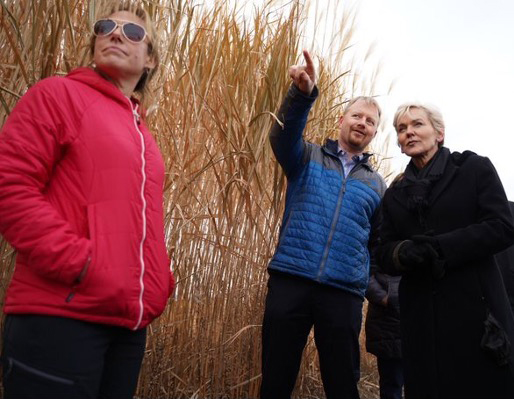
Adapted from a news release by the University of Illinois Urbana-Champaign.
The U.S. Department of Energy has renewed funding for the Center for Advanced Bioenergy and Bioproducts Innovation (CABBI), led by the University of Illinois Urbana-Champaign, for a total investment of $237.9 million from 2017 to 2027. Several Colorado State University researchers are members of the research center’s team.
CABBI is one of four large-scale DOE-funded research centers focused on innovation in biofuels, bioproducts and a clean energy future for the country. CABBI is a collaboration among 20 partner institutions across the nation. The funding extends the center’s work for five more years.
“To meet our future energy needs, we will need versatile renewables like bioenergy as a low-carbon fuel for some parts of our transportation sector,” U.S. Secretary of Energy Jennifer M. Granholm said in the DOE news release. “Continuing to fund the important scientific work conducted at our Bioenergy Research Centers is critical to ensuring these sustainable resources can be an efficient and affordable part of our clean energy future.”
CSU scientists William Parton, Melannie Hartman and Susan Lutz, from the Natural Resource Ecology Laboratory in the Warner College of Natural Resources, are members of CABBI.
“The goal of the CABBI project is to evaluate the potential to use perennial and annual bioenergy crops to produce ethanol, jet fuel and other bioproducts while supporting a clean energy economy,” said Parton, a CABBI lead scientist. “Results from previous research show that growing cellulosic bioenergy crops could replace all the corn grain currently used to produce ethanol in the U.S. and greatly reduce agricultural net greenhouse gas emissions and nitrate leaching into the Gulf of Mexico.”
Andrew Leakey, professor and head of the Department of Plant Biology at Illinois, will continue as director of CABBI, a position he has held since 2020.
“Energy independence has become an increasingly important security issue for the United States, and CABBI will continue to provide breakthroughs toward a new generation of sustainable, cost-effective biofuels and bioproducts that will replace fossil fuel-based products,” Leakey said. “This grant represents a massive investment in CABBI and its diverse team of scientists. We are committed to help push the U.S. toward a new bio-based economy.”
During Phase II, CABBI researchers will continue to develop fuels and products by integrating three highly interconnected DOE priority areas:
- Feedstock Production — Led by Emily Heaton, a professor of Regenerative Agriculture in Crop Sciences at Illinois, scientists use the “plants as factories” paradigm, in which biofuels, bioproducts and foundation molecules for conversion are grown directly in crops that are resilient and productive.
- Conversion — Led by Huimin Zhao, the Steven L. Miller Chair in Chemical Engineering at Illinois, experts continue to develop unique tools, yeasts, enzymes and processing methods to efficiently produce diverse, high-value molecules such as biodiesel, organic acids, jet fuels, lubricants and alcohols.
- Sustainability — Led by Wendy Yang, associate professor of Plant Biology and Geology at Illinois, researchers provide a holistic and systems-based approach to assess the economic and ecological sustainability of CABBI feedstocks, biofuels and bioproducts from the Feedstock Production and Conversion Themes, at scales that range from the field to the biorefinery to the bioeconomy.
“Our economy and society will be strengthened by enhancing the productivity, resilience and sustainability of our agricultural system,” Leakey said, “and CABBI will help lead the way toward the cutting-edge scientific discoveries and technologies needed to sustainably and profitably produce fuels and chemicals using plants and microbes.”
Phase II partner institutions include Brookhaven (N.Y.) National Laboratory; Lawrence Berkeley National Laboratory in Berkeley, Calif.; Lawrence Livermore National Laboratory in Livermore, Calif.; HudsonAlpha Institute for Biotechnology in Huntsville, Ala.; the U.S. Department of Agriculture’s (USDA) Agricultural Research Service (ARS) in Houma, La., Peoria, Ill., and Urbana, Ill.; Alabama A&M University (new addition for Phase II); Colorado State University; Iowa State University; Mississippi State University; Penn State University; Princeton (N.J.) University; Texas A&M University; University of California-Berkeley; University of Florida; University of Minnesota-Twin Cities; University of Nebraska-Lincoln; the University of Wisconsin-Madison; and West Virginia University.
The center employs nearly 60 faculty-level researchers — including seven from underrepresented groups who were added since the founding in 2017 — more than 160 postdoctoral researchers and technicians, 90 graduate students, 50 undergraduates and 15 support staff.
The Bioenergy Research Center program was established in 2007 and, in total, has led to 4,452 peer-reviewed publications, 845 invention disclosures, 715 patent applications, 298 licenses or options, 261 patents and 22 start-up companies as of August 2022. Learn more at the Center for Advanced Bioenergy and Bioproducts Innovation website and science.energy.gov. Read the original news release.